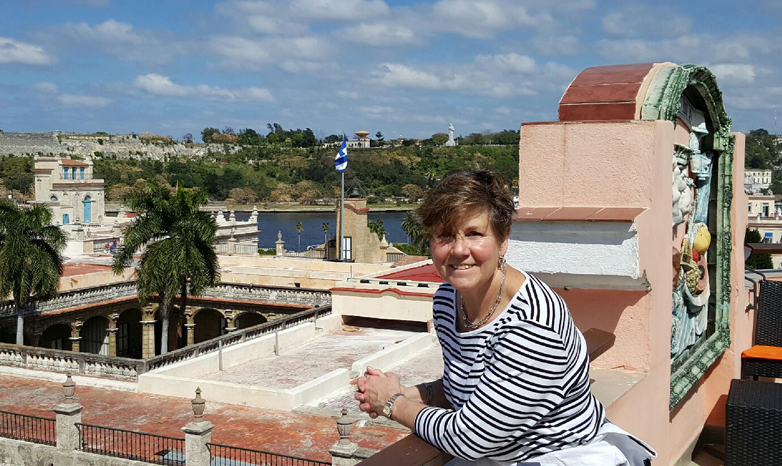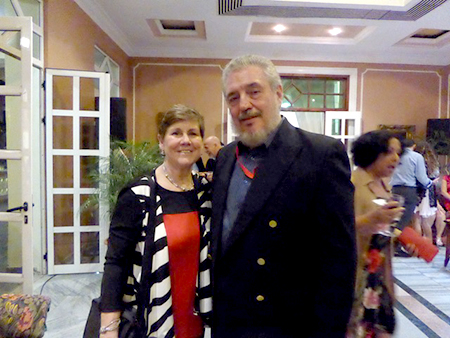SRU’s Norton strikes another first with invitation to attend educational conference in Cuba

Feb. 29, 2016
SLIPPERY ROCK, Pa. - Breaking new ground isn't new to Slippery Rock University President Cheryl Norton. After all, she's twice been named the first female president of a university.
Norton recently continued her trailblazing ways when she was selected as one of only 15 U.S.-based university presidents to attend the 10th Congress for International Higher Education, Feb. 15-19, in Havana, Cuba.
The conference followed on the heels of an exploratory visit to the country last fall by the American Association of State Colleges and Universities who were in Havana to tour some of Cuba's universities and discuss potential educational partnerships with the Ministry of Higher Education.
The February conference, which was sponsored by AASCU, allowed Norton to meet and discuss the current state, and future of, higher education with more than 2,000 delegates from 60 countries.
"I'd like to think that SRU's progressive work with international programming was helpful in our selection to attend," said Norton. "The fact that we have a school with a reputation that proceeds it nationally, and now, even globally, indicates the quality of work we do here."
SRU currently has 48 international partnerships in place or in the works with institutions in 22 countries - Australia, China, Mexico, Japan, Poland, Scotland, Slovakia, South Korea, Spain, France, Hungary, England, Belgium, India, Ireland, Germany, Sweden, Sri Lanka, Turkey, Spain, Malaysia and Vietnam.
Norton is hopeful that the recent thawing of relations between the U.S. and Cuba - which included the recent re-opening of the American Embassy in Havana - will provide positive steps for education as well.
"I'd like to think that education is apolitical and that education is one of those areas that we can all agree on," said Norton. "It's important that people be able to exchanges information and ideas for the betterment of student success. I'd like to believe that this conference was a meaningful step in preparing the way for that to happen."
Several U.S. colleges have already struck agreements with Cuban schools. At Auburn University in Alabama, the college of agriculture has partnered with Agrarian University of Havana under a new five-year agreement, while the University of the District of Columbia and California State University, have also signed deals with Cuban schools.
Under previous travel rules, some colleges had gained permission to launch academic trips to Cuba, but the process was often riddled with bureaucratic barriers. Even those who went through the lengthy application process often were denied.
The U.S. has eased those rules this year, and while tourism is still forbidden, the new rules make it easier to travel for educational purposes.
Norton added that Cuban officials, while interested in developing and fostering additional partnerships, would look to proceed slowly with an eye on first establishing faculty-to-faculty collaborations.

Norton with Fidel Castro Jr.
"In a very preliminary sort of fashion, we discussed, as a unit, that faculty-to-faculty wouldn't even be a full semester at the start," Norton said. "We'd probably look at a two to three week endeavor...hosting a Cuban professor who could do a 'job shadow' sort of thing in the beginning, with an opportunity to conduct some guest lectures as well in an appropriate course.
"This type of scenario would allow them to get a feel for what we do and how we do it. I was even thinking to myself that should we host a visiting professor that they have a chance to visit with several (State System) institutions while in our country," Norton said.
Norton continued that this type of endeavor would allow both countries to get their feet wet and test the waters for deeper and more meaningful collaborations down the road. "I'm sure we'd have faculty that would love to do the same sort of thing as partnerships continued to evolve," she added.
A potential hindrance to establishing a quick influx of educational ties could be the state of Cuba's infrastructure. Internet access, for example, is still relatively rare, according a report from the Huffington Post.
According to Norton, the lack of adequate hotels, transportation and restaurants is a factor for those visiting the country. "The AASCU officials who made both trips remarked on the advancements just since the fall visits, but (Cuba) are lagging behind in those areas," said Norton.
Norton noted that many Cubans have converted the fronts of their houses into small restaurants in order to accommodate growing number of international travelers.
"They are very cautious about how fast they want to move because they understand the limitations of what the island can tolerate and what a flood of people and industry, all at once, could mean for them," Norton said.
While no hard and fast discussions were held regarding study abroad opportunities, Norton is hopeful that would also be an option down the road. "I think it would be an interesting experience and wonderful opportunity for all parties involved given the rich culture and history both sides could impart on one another," said Norton.
As for next steps in formulating any potential partnerships, Norton believes Cuban and AASCU officials will look at creating a list of those U.S. institutions interested in developing educational partnerships with the Hispanic nation, as well as looking at common areas of interest among potential schools.
"I think the conference provided a pretty good preview of bigger things to come," said Norton. "I'm looking forward to exploring all the possible options available to us."
MEDIA CONTACT: Robb King | 724.738.2199 | robert.king@sru.edu

